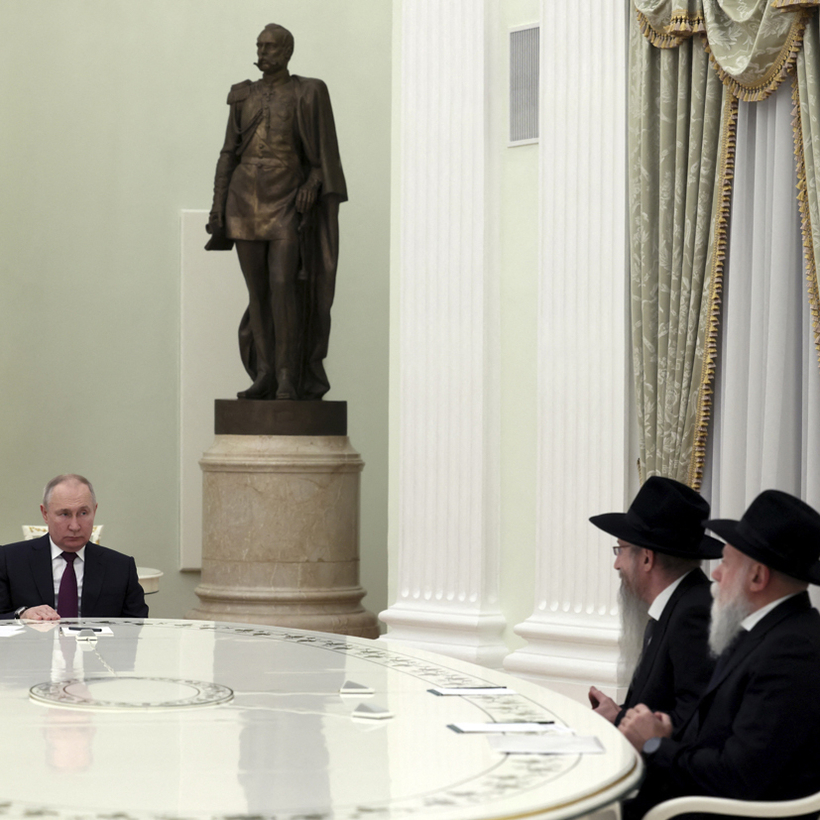A few months ago in Jerusalem, at a dinner with an Israeli rabbi who had strong connections to the Hasidic community in Russia—the only branch of Judaism recognized by the Kremlin—I asked if Russia’s lawsuit against the Jewish Agency, a nonprofit that promotes immigration to Israel, and the increasingly anti-Semitic rhetoric by Russian officials and state media (Volodymyr Zelensky is now officially introduced as “a terrorist and a shame to the Jewish people” on Russian TV) meant that the situation for Russian Jews was becoming perilous.
The rabbi replied that a sign of the coming persecution of Jews in Russia would be if Jewish religious leaders started publicly praising Putin and voicing approval for his war in Ukraine. It would mean that they’re sacrificing their beliefs to ensure the safety of the Jewish community in Russia. This praise, he said, would be one of the last lines of defense against what is widely seen as a de facto fascist regime.

Three days before an anti-Semitic mob stormed the airport in the Russian city of Makhachkala, searching for Jewish passengers arriving on a flight from Israel, Berel Lazar, the Milan-born chief rabbi of Russia, spoke before a visibly bored Vladimir Putin and the country’s religious leaders. Lazar, a U.S. citizen who earned the nickname “Putin’s rabbi” for his close ties to the Kremlin, said that he had no doubts that Israelis and Palestinians could live in peace and all the world had to do was follow Russia, where Christians, Jews, Muslims, and Buddhists effortlessly coexist.
A sign of the coming persecution of Jews in Russia would be if Jewish religious leaders started publicly praising Putin and voicing approval for his war in Ukraine.
“Why is it that we can all be friends here, help each other, and be joyful together, and there [in the Middle East]—we can’t?” asked Lazar. “The answer is simple: we have a wise president … ” (It is worth noting that another prominent Jewish leader, the chief rabbi of Moscow, Pinchas Goldschmidt, fled to Israel in 2022 after speaking out against Putin’s invasion of Ukraine.)
Mere hours after Rabbi Lazar extolled Vladimir Putin’s unique leadership style, a Hamas delegation toured Moscow. The terrorist group held talks with Russia’s Ministry of Foreign Affairs and was handed a list of eight Russian-Israeli dual citizens whose release from Gaza the Kremlin was trying to secure.

“In response to this request, we have a more positive and attentive attitude compared to others [requests from other nations], due to the nature of our relationship with Russia,” said a press release from Hamas. It became clear that in the Israel-Hamas war, Russia would not back the Jewish state.
Since the October 7 terror attack that saw more than 1,400 Israelis brutally murdered by Hamas, the Kremlin has been slowly aligning itself with the Islamic terrorist group. The heinous act has been declared a failure of U.S. foreign policy and a symbol of its waning influence in the Middle East. Russian propagandists, barely hiding their joy at the fact that Hamas managed to break through Israel’s defenses, implied that the same could be done to the U.S. military: as one TV anchor put it, “The myth of an Israeli fortress is no more. What’s next, American aircraft carriers?”
In the Russian tradition of following an outrageous claim with an even crazier one, next came an assumption that the attack on Israeli civilians was a false-flag operation by the U.S. government to get Biden re-elected. “Biden is losing,” observed a Russian political scientist on a popular evening talk show. “He needs something big.”
Since the October 7 terror attack that saw 1,400 Israelis brutally murdered by Hamas, the Kremlin has been slowly aligning itself with the Islamic terrorist group.
Alas, something big happened in one of Russia’s most volatile regions: Dagestan.
Like neighboring Chechnya, the predominately Muslim region on the Caspian Sea was conquered in the Caucasian War, which started in the 19th century and lasted for almost 50 years, becoming one of the longest conflicts in Russian history. As is the case with most Russian wars of conquest, victory in Dagestan was achieved through mass murder: many nationalist historians will proudly tell you how the Russian military doctrine of the time called for razing an entire village for every imperial soldier killed. Putin rules the impoverished republic in a 19th-century colonial fashion, through brute force and the corruption of local elites.

In Moscow, rich kids tell stories of their wild trips to Dagestan, where children of local officials are seemingly impervious to federal laws as they race Lamborghinis and shoot guns into the air. But in 2018, when an election in Dagestan went wrong for the Kremlin, Moscow launched a so-called anti-corruption operation in the Muslim republic.
These happen across Russia, but Dagestan—locked in a centuries-long conflict with Moscow—is regarded by the Kremlin as a powder keg and is treated as such. A person connected with the Russian security services once boasted that the “operation” started with Ka-52 attack helicopters securing the Makhachkala airport to fly in groups of heavily armed special forces who would then raid the capital and arrest key Dagestani officials, executing a successful decapitation strike against the local government of a Russian region.
The same playbook was used in the first days of Russia’s assault on Ukraine, albeit with different results. In a region with a pronounced cult of masculinity, this power grab by Moscow amounted to a national humiliation.
In the first days of the Russian invasion of Ukraine, it turned out that many casualties on the Russian side were soldiers from Dagestan. As people there had told me, Dagestanis couldn’t care less about Putin’s imperial conquests and had nothing against Ukraine, but the median monthly income in the region is around $359, and enlistment is one of the few options to earn a decent salary. Most well-paying jobs in the region require an oath—if not to the state, then to the Mob.
In the first days of the Russian invasion of Ukraine, it turned out that many casualties on the Russian side were soldiers from Dagestan.
Dagestani thugs-for-hire are ubiquitous in large Russian cities, where people with money need “problem solvers” to collect a debt or simply get their point across. In Moscow, the phrase “Do I have to call Dagestanis?” gets people to comply with demands. Still, no amount of cash could justify the number of body bags flowing into the region, and the locals began to protest.
Dagestan became the only region that tried to defy Moscow’s mobilization orders, with civil disturbances breaking out in cities and villages, often coordinated through the Telegram messaging app. These were brutally crushed. Lacking the resources to fight Moscow, Dagestan, and, to a greater extent, the entire North Caucasus, turned to Islam as a means of protest. Putin’s entente cordiale with Hamas doesn’t win him any points in Dagestan, where residents view Russia the way Palestinians describe Israel: as a colonial oppressor.

Dagestani warlords from more than a century ago became folk heroes. Mixed-martial-arts fighters—the only type of celebrities in Dagestan—began preaching their D.I.Y. version of conservative Islam to their millions of followers on Instagram. When Israel started carrying out retaliatory strikes against Hamas targets in Gaza, it didn’t take long for the impoverished and radicalized population of the North Caucasus to find an enemy: the Jews. Or as Chief Rabbi Berel Lazar put it: “Something has really changed in the North Caucasus, and not for the better.”
A New York Times investigation showed that anti-Semitic posts on the Telegram messaging app began appearing weeks before the pogroms, with rumors that Jews fleeing Israel would be re-settled in Dagestan. Some appeared on the same channels that had incited anti-mobilization protests last year. Within hours, in the city of Cherkessk, protesters gathered and called for the expulsion of Jews; in Nalchik, demonstrators set fire to a Jewish cultural center that was under construction and left graffiti on a wall with the message Death to Jews.
Putin’s entente cordiale with Hamas doesn’t win him any points in Dagestan, where residents view Russia the way Palestinians describe Israel: as a colonial oppressor.
In Khasavyurt, hotels were raided in search of Israelis and Jews, but the biggest pogrom happened at Makhachkala airport, where hundreds broke through the barriers and occupied the tarmac, intending to lynch any Jewish passengers they found, throwing stones at buses, and trying to board airplanes with terrified passengers inside.
According to the independent Russian news outlet Meduza, this live-streamed, 21st-century pogrom was first regarded by the Kremlin as a joke: staffers would forward each other videos of hotel raids and pictures of anti-Semitic signs. According to Meduza’s sources in the Kremlin, it was only when the airport was stormed that the gravity of the situation set in. Russian ultra-nationalists, hardly fans of the Jews, began to see the pogroms as a threat not just to the Jews but to ethnic Russians. Some influential bloggers wondered, What’s next? Would there be “pogroms” in Moscow? Others suggested that the mob take out its anger on other Jews, “those in Israel and in Kyiv.” Putin, in an emergency meeting of Russia’s Security Council, predictably blamed the West.
It is widely understood that Putin is trying to use the bloodiest attack on Jews since the Holocaust as a means to further destabilize the Middle East and divert the West’s attention from the war in Ukraine. But the shocking events in Dagestan, even if downplayed by the Russian propaganda machine as anti-Israel protests that merely got out of hand, paint a picture of a foreign-policy move backfiring spectacularly.
In taking advantage of the tragic events in Gaza to advance on the battlefield in Ukraine, Putin might have created a Gaza of his own. And just as in the volatile Middle East region, it’s the Jews who are the first to get hurt.
Andrew Ryvkin is a screenwriter, journalist, and Russian-affairs specialist


